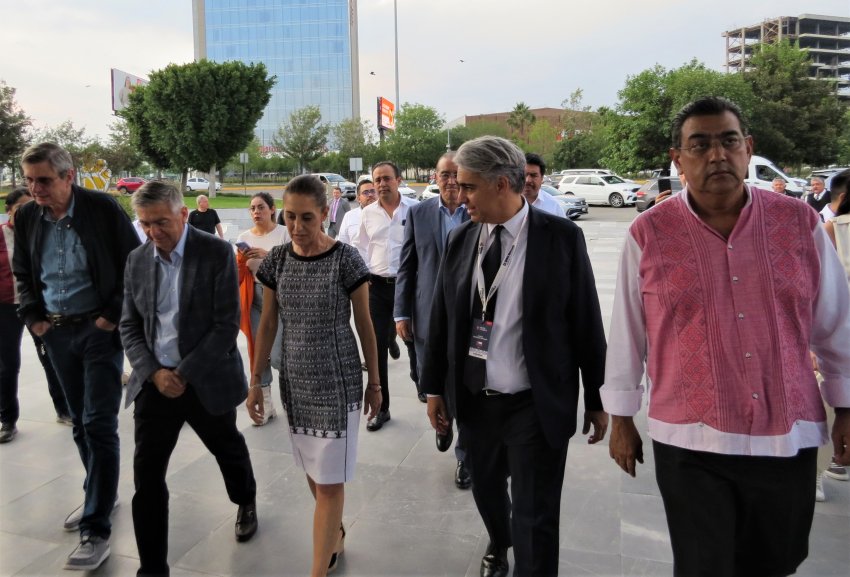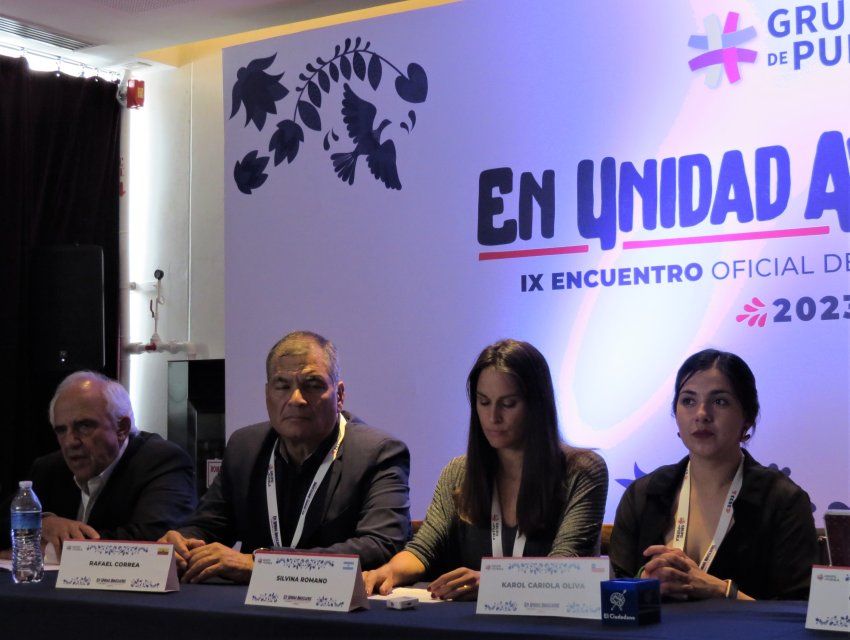
On Saturday night, I sat by a fountain outside the International Museum of the Baroque here in Puebla, Mexico, reflecting on how left-wing governments in Latin America have shifted over the past decade.
Inside the museum, the Puebla Group (Grupo de Puebla) was meeting. Self-identifying progressive leaders from the region, including numerous current and former presidents and vice presidents had gathered together to discuss further regional integration, combating climate change, a regional currency and opposing sanctions.
The meeting was being held in the most elite part of Puebla city — an area called Angelopolis, where huge highways weave between modern residential towers and luxury shopping centres. There are no street stalls with people selling hot corn, basket tacos, cakes from shopping trolleys, or oily chalupas like in most other urban parts of Mexico. In this exclusive area, the drains actually work, the streets are clean and aren’t broken and it’s hard to get anywhere without a car.
You could argue the conference venue was chosen for security reasons, but there were many other differences between this weekend’s meeting and the first CELAC (Community of Latin American and Caribbean States — also attended by left presidents and aimed at regional integration) that I covered in Caracas in 2010. There, alternative and community media, and movement representatives were welcomed and looked after, with access to the same computer, phone, and internet facilities as mainstream journalists. They were encouraged to attend by the extra public transport that was organised, complete with hundreds of signs pointing to the venue. It felt like a significant event and a coming together of activist forces, rather than the routine, formal procedures of this weekend’s Puebla Group meeting.
Dulled policies
Sitting by the fountain, it seemed to me that the evolution of these conferences is indicative of the shifting tendencies among left-wing governments in Latin America. I have noticed a new cautiousness, a softening of policies, less political participation of oppressed peoples, and increasing detachment from grassroots movements — though also big variations from country to country.
Latin America is now dominated by the left. A left-leaning, anti-corruption candidate will be the new president of Guatemala after winning elections in August (and he was at the weekend’s Puebla Group conference). Last year, Colombia also gained its first left-wing president in decades, and Luiz Inácio “Lula” da Silva’s defeated far-right president Jair Bolsonaro in Brazil. The right wing is in power in Ecuador, but a return to the Citizen Revolution party is viable in elections this month.
A united left in Latin America has the potential to do amazing things. Yet, the integrity, bravery, and boldness of 2000‒10 — when groundbreaking projects were launched and thousands of grassroots activists attended social forums and mobilised around Venezuela and other parts of the continent — seems to have waned.
Lula is playing a leading role, focusing on uniting, even with right-wing forces, and on avoiding conflict. He has proposed a single currency to counter the US dollar, and his policies mark a shift towards pragmatic economics and activating markets, rather than popular empowerment. Activists have been appointed to the Indigenous and environment ministries.
Here in Mexico, president Andres Manuel Lopez Obrador (AMLO) shouted, “Long live migrants” as part of his Independence Day speech a few weeks ago, then last week agreed with the United States to deport migrants in border cities back to their countries of origin. While the government has raised public retirement pensions and student scholarships, most of its policies have been fundamentally neoliberal. AMLO has made deals with multinationals in order to build the mega Maya Train tourist development and the Santa Lucia airport, without consulting local communities and despite resistance from social movements.
Leftist student leader Gabriel Boric, elected president of Chile at the end of 2021, did boldly attempt a new constitution that included important changes like social rights to food and housing, citizen consultations, Indigenous land rights and a state duty to fight climate change. On the other hand, the Boric government has ordered repression of marches a few times now, with 195 people arrested and 25,000 soldiers mobilised against marches marking the 2019 wave of protests, in October last year.
Each country is, of course, very different and complex. While Cuba stands firm and Gustavo Petro in Colombia has implemented important tax reform (then held large marches after other reforms stalled in Congress), the Honduran left-wing president hasn’t kept most of her key promises, and in Venezuela, it is no secret that both external factors like the cruel US sanctions as well as internal factors have led to an increasing disconnect between the Nicolas Maduro government and the bases.
What is going on? Why is left-wing discourse (such as AMLO declaring an end to the “neoliberal economic model” in 2019) still so popular, but the implementation of its basic tenets (such as solidarity, Indigenous rights, environmental policy) often so far behind the discourse, these days?
Have progressive governments become intimidated by the US sanctions in Venezuela, and the coups — supported by the US — against left-wing governments in Peru (December 2022) and Bolivia (2019) and other countries? Were many of those governments instead using left-wing discourse to get elected while being insincere in their intentions, or have many of the activists and leaders switched to career politics, where there is more fame and fortune?
391 - Grupo Puebla2 cr Tamara Pearson.jpg

At this weekend’s Puebla Group press conference, I asked about the waning connection between progressive governments and social movements and marginalised peoples.
“The transformation processes go hand in hand with the advancement of progressive governments in Latin America. That’s why we explicitly support progressive projects like Luisa (González, left-wing presidential candidate in Ecuador) and Claudia (Sheinbaum, candidate for Morena in Mexico’s presidential elections next year),” was the limited response from Chilean deputy, Karol Cariola Oliva.
“The neo-right wing (alluding to the extreme right and to neo-fascism) that is being created here, they are the ones that are truly scary, their behaviour is anti-democratic,” said former Colombian president Ernesto Samper. While he may be right, I have noticed many progressive leaders concentrating on staying in power more than on the political processes of social change that extend beyond government. It seems the US’s intervention and local capitalist interests have forced much of Latin America into survival mode — yet movements are essential to that survival.
The Puebla Group’s final statement focused on a “solidarity-based model of development to replace the neoliberal model, that is based on social inclusion, value generation, ecological transition … and a new democratic citizenry.”
The Puebla Group also called for a new “financial architecture adapted to the needs of the region” and condemned the “attempts to sabotage the transition of the newly elected government of Guatemala” — referring to the “lawfare” waged against Arévalo and his party.
Former Ecuadorian president, Rafael Correa stated at the press conference that the sanctions on Cuba and Venezuela are an “act of war”.
“If we (progressive Latin American countries) don’t act in a united way, then we won’t deal with any of these problems,” said Cariola.
Little change without social movements
Social change, especially when you have the US to your north, is a very hard and uneven process. There is no doubt that many progressive governments, afraid of the consequences of standing up to the deeper forces of imperialism and big business, prefer to dilute their policies.
But many so-called progressive leaders are also making the huge mistake (or using a deliberate strategy) of lumping social movements and alternative and community media in with attacks by right-wing forces. On numerous occasions, AMLO has labelled the huge feminist movements in Mexico as “conservative” and accused them of being “reactionary, against our transformation policy”.
There are now enough left-leaning governments in Latin America for them to unite and then lose any defensive complacency, fluffy discourse, and self-justification, and instead embrace critical allies like social movements.
For months after the left-leaning president Pedro Castillo was removed in a coup in Peru last year, grassroots movements mobilised, blocked roads, and made unelected president Dina Boluarte’s rule difficult. In Venezuela, it was communities organised into councils and communes that finally began to defeat corruption, inequality, racism, sexism, and organised violence.
But most of Latin America’s current progressive governments are turning their backs on their biggest ally, to large or minor extents. The question is, is it due to fear, exhaustion and a tactical mistake, or because of various competing forces within the governing party, weaker social movements, a lack of resources due to the behaviours of previous governments, or a sincere reflection of their real political agenda — or some combination?